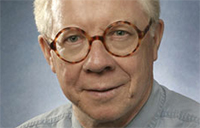Ramsay Cook, a distinguished member of the Department of History from 1969-96 and then professor emeritus, died on July 14 in Toronto.

Born in Alameda, Sask., Prof. Cook began his academic career by completing his bachelor of arts degree at the University of Manitoba in 1954. He then went on to Queen’s University to complete a master’s degree in 1956 under the direction of Professor Arthur Lower. His thesis focused on civil liberties. Cook completed his PhD at the University of Toronto in 1960 with a dissertation on journalist John W. Dafoe. The revised thesis became his first book, The Politics of John W. Dafoe and the Free Press (1963), a study which reveals some of the basic characteristics of his scholarly work. This first study revealed his fascination with ideas and the process of nation building, themes that would occupy him throughout his career.
For 36 years as a professor of Canadian history, first at the University of Toronto and then at York University, Prof. Cook motivated countless numbers of undergraduate and graduate students to take up the study of Canada. It was quite a coup on the part of a fledgling university to attract so promising a historian away from the University of Toronto, and Prof. Cook’s presence at York University immediately gave the Department of History a status across the country. Throughout his career, he also sought out and offered encouragement and mentorship to scholars of Canadian history in Canada and beyond whose work he admired. As a visiting professor to universities in the U.S., the former Soviet Union, Japan, India, Austria and China, he introduced dozens of international students and professors to Canada and its past. Prof. Cook was a historian who believed that it was important to speak to multiple audiences about Canada and its history. Throughout his career, he engaged in broad debates about Canadian identity and Canadian nationalism through his writings and other media appearances.
In the 1970s, Prof. Cook focused his attention on the social reform and social criticism movements that emerged in English-speaking Protestant Canada at the turn of the century. His research into the history of the ideological origins of these movements and the proposals of some of their most prominent leaders appeared in a study titled The Regenerators: Social Criticism in Late Victorian English Canada (1985). This study demonstrated how and why many of the thinkers who promoted “social regeneration” contributed in unforeseen ways to the various forces promoting secularization. The study contributed to launching a debate on the impact of the scientific and social revolutions on Protestant theology in Canada and the responses of various Protestant clergy and Christian socialist labour militants to the crisis that ensued.
Prof. Cook was the author of some 15 books, editor of 11 books and more than 60 articles in refereed and non-refereed journals. He was the editor of the Canadian Historical Review from 1963-68, became the executive editor of the Canadian Centenary Series from 1983-88 and was the executive editor of the multi-volume Dictionary of Canadian Biography/Dictionnaire biographique du Canada from 1989 to 2006. Several of his books have been translated into French and Japanese.
Throughout his academic career, Prof. Cook’s many accomplishments were widely acknowledged. In 1986, he was elected a Fellow of the Royal Society of Canada. He was an Officer of the Order of Canada. He won the J. B. Tyrell Medal from the Royal Society of Canada in 1975, the Governor General’s Literary Award for Non Fiction in 1985 for his book The Regenerators, which was released in a second edition this year, and the Molson Prize in the Social Sciences & Humanities in 2005, a prize that marks a substantial and distinguished contribution over a significant period of time to the cultural or intellectual heritage of Canada. Twice he received the President’s Medal from the University of Western Ontario for the best scholarly article. In 2005, he was named a member of York University’s Founders Honours Society. He was a visiting professor of Canadian studies at Harvard University in 1968-69 and visiting professor at Yale University in 1978-79 and 1997. He was also the recipient of six honorary degrees as well as being named to the Order of the Sacred Treasure by the government of Japan in 1994. On his retirement, thanks to generous donations from his colleagues, friends and several important charitable foundations, the department established in his honour the Ramsay Cook Research Scholarship for graduate students in Canadian history.
As a colleague, he participated vigorously in departmental life at York University and, when he deemed it necessary, intervened in characteristically feisty manner at departmental meetings. He also had a great love for the Canadian outdoors; he was a gifted swimmer and dedicated birdwatcher, and was an informed admirer of Canadian painting and northwest coast native art.
A memorial service will be announced in due course and the Department of History will hold an event in the fall to mark Prof. Cook’s distinguished career.


